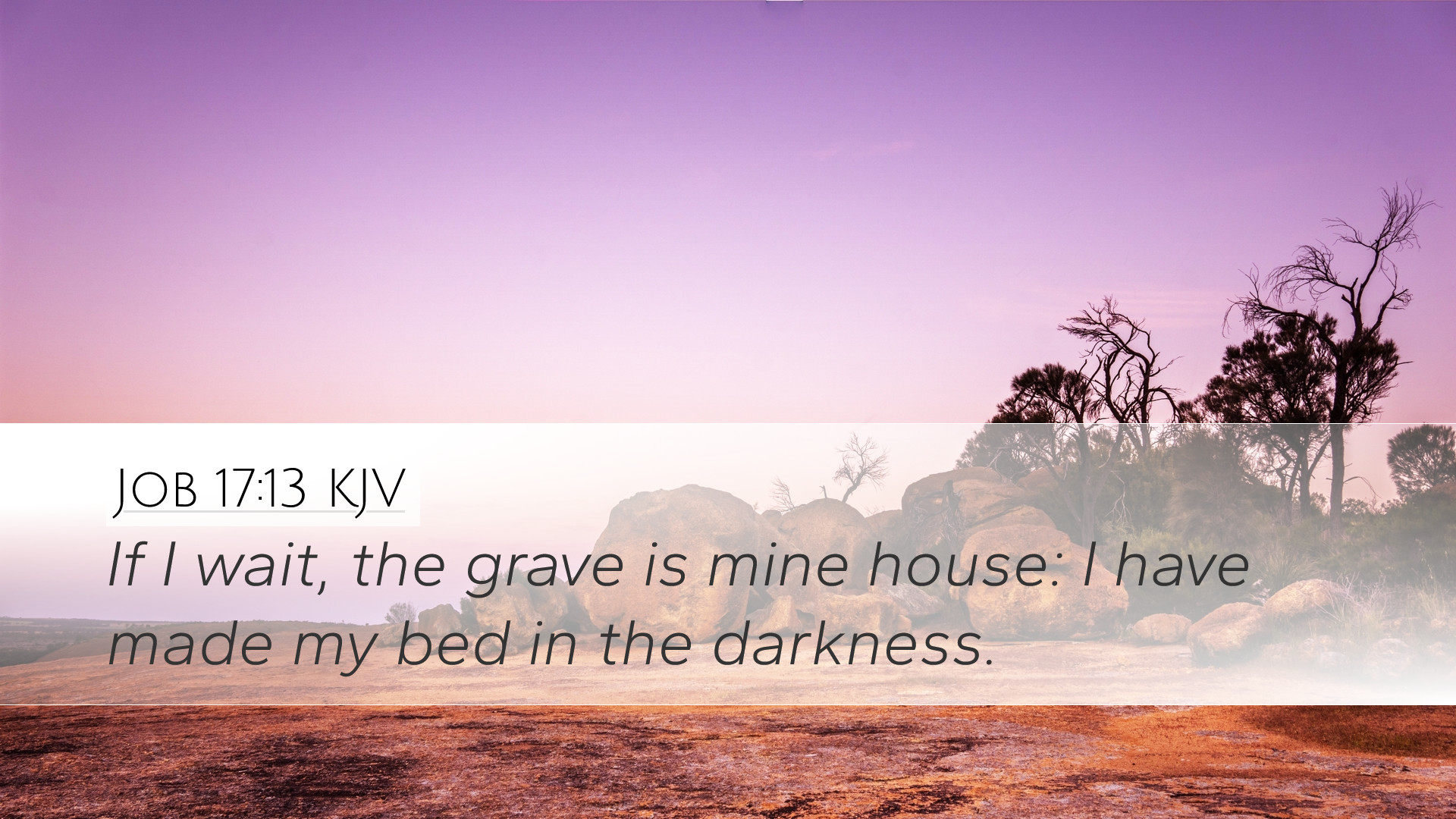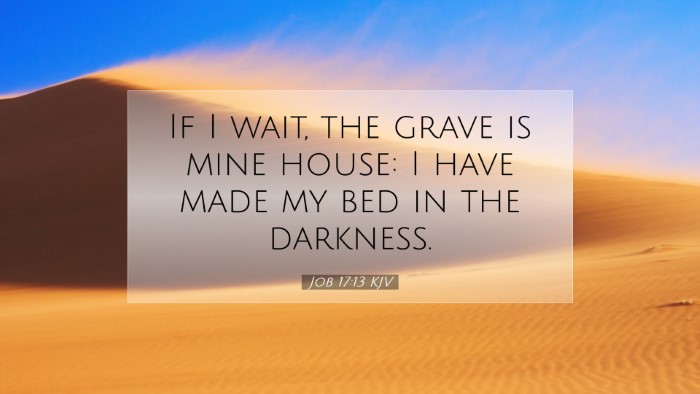Old Testament
Genesis Exodus Leviticus Numbers Deuteronomy Joshua Judges Ruth 1 Samuel 2 Samuel 1 Kings 2 Kings 1 Chronicles 2 Chronicles Ezra Nehemiah Esther Job Psalms Proverbs Ecclesiastes Song of Solomon Isaiah Jeremiah Lamentations Ezekiel Daniel Hosea Joel Amos Obadiah Jonah Micah Nahum Habakkuk Zephaniah Haggai Zechariah MalachiJob 17:13
Job 17:13 KJV
If I wait, the grave is mine house: I have made my bed in the darkness.
Job 17:13 Bible Commentary
Commentary on Job 17:13
Verse Context: Job 17:13 states, "If I wait, the grave is mine house: I have made my bed in the darkness." This verse encapsulates Job's deep despair and reflects his thoughts on death and hopelessness during his suffering.
Introduction
In this poignant moment of his discourse, Job reflects on his abject condition and the inevitability of death. His eloquent expression reveals not just a sense of personal tragedy, but a profound theological meditation on mortality and the silence of God in the face of human suffering. In examining this verse, we draw insights from the commentaries of Matthew Henry, Albert Barnes, and Adam Clarke to provide a comprehensive exploration of its meaning and implications.
Job’s Perspective on Death
Matthew Henry's Insights: Henry notes that Job personifies death as a house, a final destination where he anticipates lying down. This metaphor showcases Job's resignation to his fate and his acknowledgment of death as the ultimate conclusion of his trials. Henry points out that the grave, often feared and avoided, is here given a sense of familiarity—a place Job intends to inhabit soon, thus reflecting the depth of his suffering.
Albert Barnes' Analysis: Barnes emphasizes that Job's declaration stems from his profound feeling of isolation and abandonment. For him, the grave becomes an escape from not only his physical pain but also the relational agony of being misunderstood by friends and seemingly forsaken by God. The weight of his afflictions leads him to a place where he finds solace, albeit temporary, in the thought of death.
Adam Clarke’s Commentary: Clarke elaborates that Job uses the imagery of making his bed in darkness to represent despair. The choice of "darkness" signifies both ignorance of the future and the finality of death. Clarke highlights that this expression of making his “bed” portrays an acceptance of his reality, suggesting that even in darkness, Job’s honesty about his feelings toward life and death is profoundly significant.
Theological Implications
The verse raises essential questions about the nature of suffering and the believer's relationship with death. The early voices in the text capture a struggle that resonates across generations, inviting readers to ponder their own perspectives on mortality.
- Human Mortality: Job's acceptance of death encourages a sober view of life’s fleeting nature. Each commentary reflects on this theme, urging readers to confront their temporal existence with wisdom and understanding.
- God's Presence in Suffering: Job’s cries reveal a perceived absence of God during his afflictions. This wrestle grapples with profound questions about theodicy, inviting theologians to explore how divine justice coexists with human suffering.
- The Role of Community: Reflecting on Job’s isolation, the commentaries suggest that the community’s support is invaluable during times of personal anguish. Job's interaction with his friends accentuates the need for compassionate engagement rather than theological debates.
Practical Application for Today
Understanding Job 17:13 offers pastors, students, theologians, and Bible scholars a platform to engage with contemporary issues of suffering and hope. The insights from the commentaries can guide them in ministerial care and personal reflection. Here are some practical applications derived from this discourse:
- Empathy in Pastoral Care: Pastors are reminded to listen and empathize with those in pain, recognizing that, like Job, many feel shrouded in darkness.
- The Importance of Honest Communication: Engaging openly with despair and doubt serves to foster genuine faith and community. The reluctance to address hard questions in the church may leave individuals feeling isolated in their struggles.
- Addressing the Reality of Death: The finality of death, as explored in Job’s lament, encourages believers to prepare for their mortality while finding hope in the promise of resurrection, as later revealed through Scripture.
Conclusion
Job 17:13 serves as a profound reminder of the existential realities faced by humanity. The commentaries of Matthew Henry, Albert Barnes, and Adam Clarke offer rich insights into Job’s interaction with suffering, death, and divine silence. These reflections encourage readers to grapple with their beliefs and foster deeper connections within their communities and their understanding of God’s presence amidst pain.


